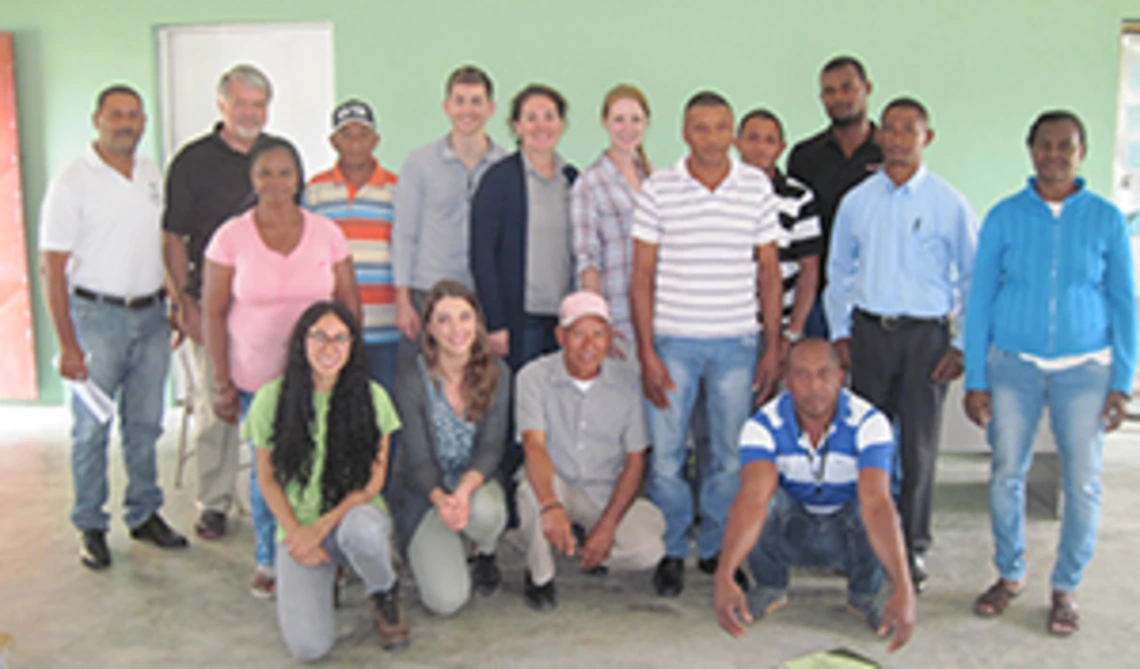Engineers Without Borders: UA Students Apply Engineering Skills in Arizona and Abroad

The UA’s chapter of Engineers Without Borders, or EWB, offers a place for the next generation of engineers to learn, grow, and lead projects of a magnitude they don’t typically experience in school, according to Sarah Moore.
Moore, former international project manager and current secretary of the EWB Mountain Region’s steering committee, has been a part of the organization since she first started her undergraduate career at the University of Arizona, where she is a doctoral candidate in CHEE. While working with EWB, Moore traveled to Bolivia in 2015 and to the Dominican Republic in January 2017. The project in the Dominican Republic is focused on irrigation.
“The community relies on rainwater for crops and wells, so we are working on an irrigation project that would help them have water year-round,” she said. The club plans to go back to the Dominican Republic in a few months to continue surveying the land in preparation for implementation.
An important part of EWB’s process is learning why projects do or do not work. Projects have a much higher chance of success if the community is fully involved.
“The projects are really driven by the community, so they have to take care of things when we leave,” she said.
For instance, when the group traveled to Bolivia to build sanitation systems for the Marquirivi community, the team found that the community simply wasn’t interested in using the systems. Moore explained that the UA’s chapter of EWB is especially vigilant about making sure that the communities they are aiming to help both want and are willing to maintain the projects.
“Other groups have to learn from our mistakes,” she said.
An Eye-Opening Trip
Norma Villagomez Marquez, a doctoral candidate studying soil, water and environmental science in the College of Agriculture and Life Sciences, said the trip was an eye-opener. She learned something on a personal level.
“It’s hard knowing how to separate emotional feelings from professional projects,” Marquez said. “We really wanted to help.”
For their work in the Dominican Republic, the team has recruited a social scientist to talk to community members before the technical work begins. “She went to basically every house in the community to talk to the families,” Marquez said.
This communication ensures community involvement with the project from beginning to end.
More Than Just a Club
To both Moore and Marquez, EWB is more than just a club on campus.
“It gives students travel, design and technical experience during their undergraduate years,” Marquez said, adding that most of the leadership positions within UA’s chapter of EWB are held by women.
“We have great female role models,” she said. “Especially when you consider, in the real engineering world, women make up about 11 percent.”
One of these great female role models is Vicky Karanikola, a research professor in CHEE and the faculty advisor for UA’s chapter.
“The most fulfilling thing about being the faculty advisor is stepping down and seeing students like Sarah and Norma take over and do better than I was doing,” said Karanikola, who as vice president of Mountain Region’s steering committee works on many EWB projects alongside Moore.
In addition to their work in the Dominican Republic, the UA chapter has launched a similar irrigation project on the San Carlos Apache Reservation, in partnership with the Nalwoodi Denzhone Community.
To learn more or get involved, contact Moore at smoore4@email.arizona.edu.
